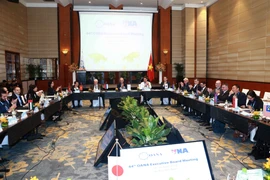Mohamed Alrayssi,Executive Director of the Emirates News Agency (WAM), advised news agencies toincrease speed and accuracy in order to better inform the public, thus helping boosttheir trust in the news sources.
He shared that WAM conductsannual surveys to see how much trust readers hold in it, as well as tries to publishnews faster and answer all questions that audiences are looking for in the newsso as to build up the agency’s relationship with the public.
Nur Cahya Aryani, headof the International News Division under Indonesia’s ANTARA news agency, saidthat combating fake news is one of the most important tasks of a news agency, whileorienting public opinion is also part of its responsibilities.
According to theIndonesian news agency representative, to meet public demand for mainstreamnews, ANTARA has established a truth verification department of 10 members todeal with fake news. Its mission is to verify unregulated news that isspreading among various platforms, especially on social networks.
Editor-in-Chief of theAustralia Associated Press (AAP) Tony Gilles emphasised that in an environmentwhere there is so much opinion guising as news and information, it is now moreimportant than ever for trusted news sources to stand out.
The AAP hasestablished a fact-checking service which it has made available on all mediaand is published it on its website, Apple News, Facebook, and Google News. Inthis service, the AAP verifies claims made by public figures, such aspoliticians, and can check what has been claimed and declare it either true offalse, thus helping enhance the trust in the AAP generally and reinforces itsbrand values, he added.
Meanwhile, LeeDong-min from the Yonhap News of the Republic of Korea said fake news isbecoming a very big issue in her country.
To fight fake news,Yonhap News temporarily set up a fact-checking team for the presidentialelection in 2017, going on to make it a permanent team as part of the newsroomin March 2018, she said. Their job is to select items – three or four per weekon average – and conduct in-depth fact checking, especially for statements bypeople with great influence.
According to her,people these days do not rely only on newspapers, news agencies, and TV news toget their information, but are more heavily interested in social networkingservices. The lack of a respected institution or mediator to verify theinformation is partly why the spread of news, especially fake news, cannot be controlledso easily on these platforms.
Therefore, as aresponsible member of the media, news agencies have to find solutions so that falsenews can be flagged, checked, verified, and corrected in a timely fashion.
OANA President AslanAslanov, who is also Chairman of the Board of the Azerbaijan State News Agency(AZERTAC), said that the issue of fake news was brought to the table fordiscussion at the 44th OANA Executive Board Meeting.
He stressed that fakenews creates a lot of problems for nations and, in particular, internationalrelations between countries. The extent of its damage can even lead toconflicts between countries.
Therefore, the AZERTACis doing its best to combat the production of fake news and the spread of fakenews.
Karel Petrak – projectmanager of Sourcefabric, Europe’s largest developer of open source software fornews media that powers news and media organisations around the world – saidthat if the firm’s news agency consumers want to use a system to deal with fakenews, Sourcefabric can build software to detect fake news by integratingexisting tools with simple operating methods, like a spelling checker forjournalists. –VNA



























